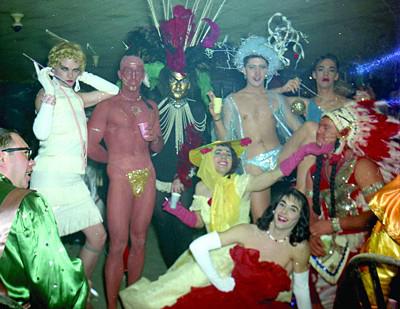New Orleans is legendary for its Mardi Gras, with its parties, parades and costumes. But less known outside of the city is the deep-rooted gay tradition of Carnival drag balls, which have been put on since the 1950s. Director Tim Wolff looks to change that with his debut film, The Sons of Tennessee Williams, which documents extensively the story of what is perhaps America’s first gay public.
“I felt like I had to pass this along, that gay history would be rewritten if I was able to do it. And I hope it will be,” says Wolff. “It’s so interesting to Google ‘gay history timeline’ and see nothing about it anywhere.”
The film, featured at this year’s Inside Out festival, captures this drag tradition, from its discreet beginnings in 1959 through today. Historical notes are punctuated by interviews with men involved with the clubs, called “krewes,” that put on the balls.
The stories these men tell are typical tales of confusion, repression and burgeoning kinship with the gay communities that quietly formed in the city’s French Quarter. Mardi Gras, they explain, was long the only day on which men could legally dress in women’s clothing; effectively, it was the only day people could be openly gay anywhere in the city. It was this publicity that eventually led to a clash between New Orleans’ gay community and the police in 1962, seven years before the Stonewall riots in New York. Despite apparent parallels between the two events, they played out quite differently in New Orleans.
“At Stonewall, they were more politicized. The men here simply wanted to enjoy their day as they saw fit, without the political inclination to overturn anything,” says Wolff.
However, overturn they did, and in 1973, Harry Connick Sr won his campaign for district attorney largely by promising to end the persecution of gays on Carnival. “Straight culture really just thought this was fabulous, and they slowly gained power from that fabulousness,” the director says.
Eerily absent from a film about a city as diverse as New Orleans are black voices. Wolff is sensitive to this issue: “I made a movie that occurs in a segregated American city, like every other city in America, and you notice.” Interestingly enough, his next movie will document New Orleans’ sissy bounce subculture, a queer black hip-hop movement that focuses on women’s sexual empowerment.
The Sons of Tennessee Williams, named in honour of New Orleans’ gay godfather, is certainly an important document for anyone interested in the development of gay visibility in North America. Although the budget is low and the editing somewhat chaotic, the sheer dedication of the krewes and the incomparable dazzle of their celebrations shines heroically throughout the film.
THE SONS OF TENNESSEE WILLIAMS trailer from tim wolff on Vimeo.

 Why you can trust Xtra
Why you can trust Xtra


